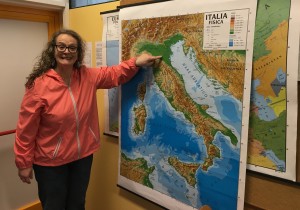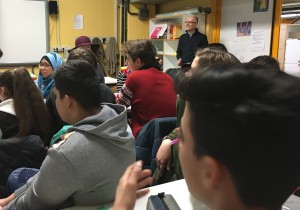
While in Palermo, our group attended a multimedia presentation portraying young migrants’ journeys. Based on true stories, the main focus of the play was the experiences of Malik Alali and Adam Hallafa. The two young teens survived their trip across deserts and the Mediterranean Sea, while traveling as unaccompanied minors. Their touching dramas were recounted in the play Il Viaggio (The Journey), directed by German journalist Karl Hoffman (Interview with the director) and Italian director Alberto Cavallotti. The play also featured Arab, African and Italian music and artists who performed at the exquisite Teatro Massimo. You can sample one of the music performances here: Nabil Salameh’s song
The two young migrants are survivors, strong but gentle. Their families chose to send them on their own, sacrificing much, in the hopes to increase their chances for a better life.
Malik is a Syrian refugee who was sent alone on this long journey. His parents hoped he could find a better life in Europe. Malik escaped the Syrian civil war. He was determined to continue his journey and hoped for a better life. Since his arrival in Europe, he has been reunited with his family and now they live together in Denmark.

Adam is now a 21-year-old young man. He came from Ghana and made the journey across the Mediterranean by himself. His only family member is his grandmother, who remained in Ghana. She did not hear any news about Adam for a very long time. His grandmother actually thought Adam did not survive the journey, but his desire to live helped him across the Mediterranean. When Adam finally had the opportunity to call and speak to his grandmother to tell her that he was alive, she could not believe the great news at first.
Adam now lives in Lampedusa, he is finishing his high school studies and is also working in a hotel and in a pizzeria. On our very last night in Lampedusa, our mosaic group had the opportunity to enjoy dinner with Adam.
During the performance, there were important signs of community engagement. First and foremost, there was the participation of a large number of children singing and dancing during musical numbers. In the audience there were many parents, siblings and other family members present in support of the event. Many people were filming parts of or even the performance in its entirety.
The mayor of Palermo Leoluca Orlando was also in attendance  and during a short performance break, he was briefly interviewed by Karl Hoffman about his work as mayor and his open opposition to the Mafia power within the city. Mr. Orlando particularly mentioned that the funds collected from the sale of properties seized from the criminal organizations are used to benefit social programs, including projects connected to migrants.
and during a short performance break, he was briefly interviewed by Karl Hoffman about his work as mayor and his open opposition to the Mafia power within the city. Mr. Orlando particularly mentioned that the funds collected from the sale of properties seized from the criminal organizations are used to benefit social programs, including projects connected to migrants.






